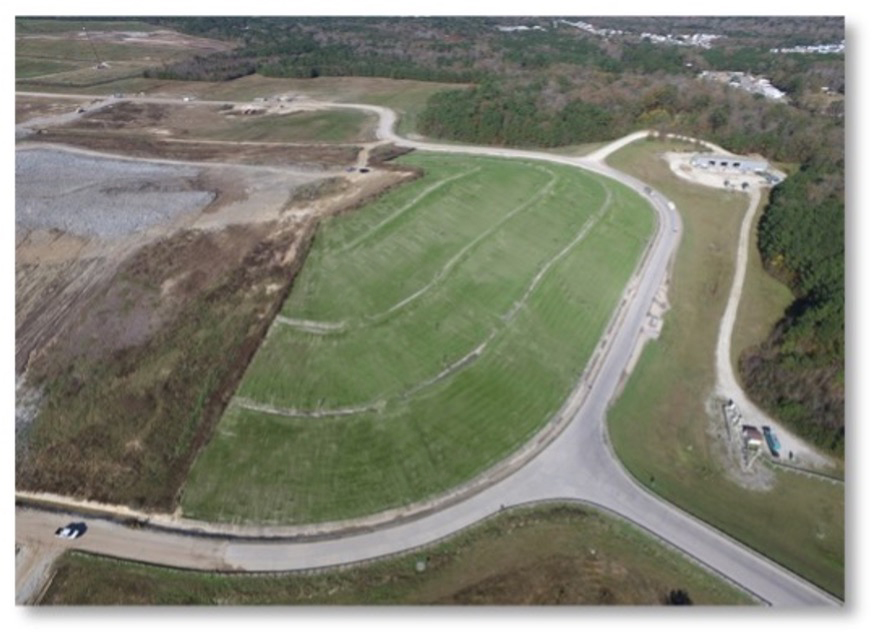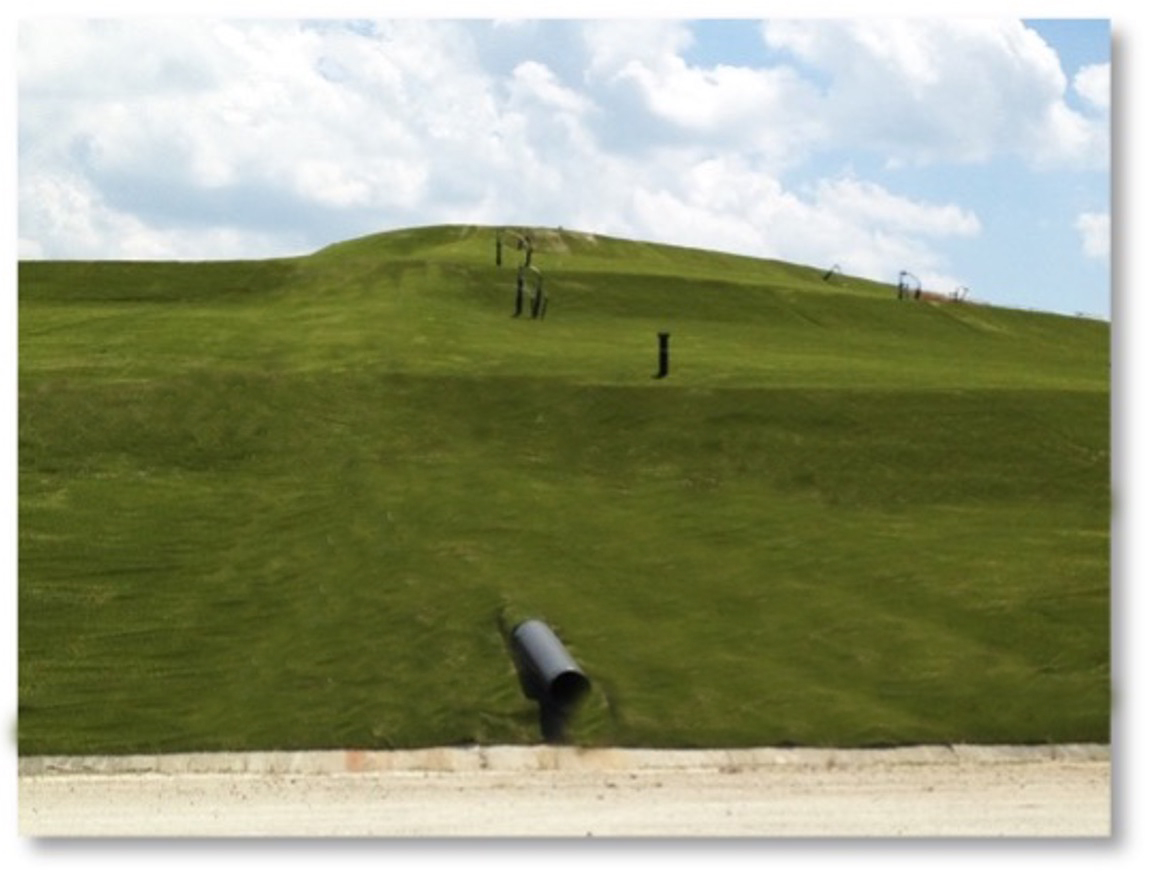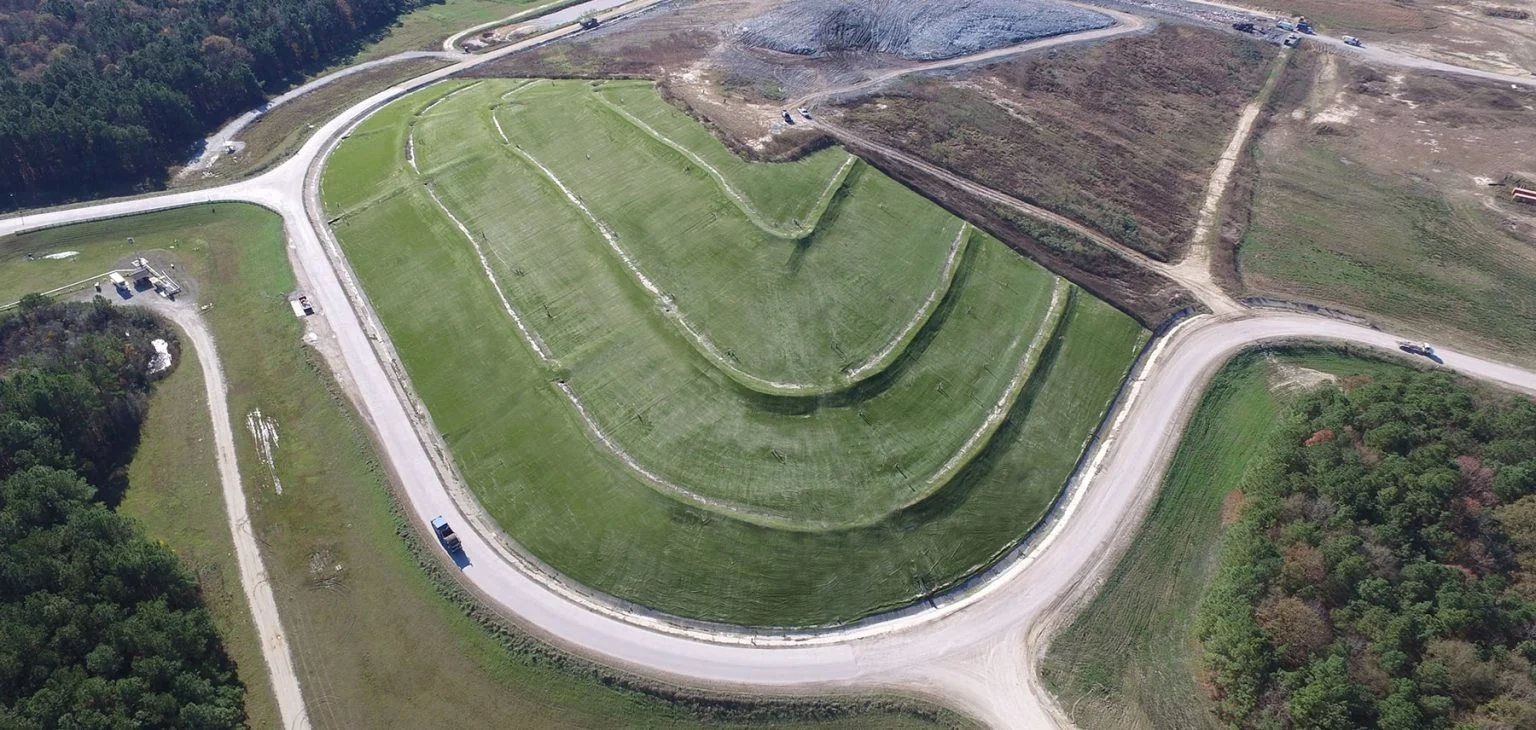The Berkeley County Landfill showcases the multiple benefits of ClosureTurf® for eliminating soil layers and erosion, reducing post-closure care, withstanding major weather events, and improving storm water quality over a traditional Subtitle D vegetative cap.
The Berkeley County MSW Landfill in Moncks Corner, South Carolina is owned and operated by Berkeley County Water & Sanitation (BCWS), and has been in operation since 1999. It’s eight cells encompass approximately 40 acres with an estimated in-place waste volume of 1.1 million cubic yards.
When the first four cells totaling 10 acres were at capacity and ready to close, Berkeley officials turned to ClosureTurf, an EPA Subtitle D compliant landfill closure system specifically designed to eliminate soil erosion, reduce post closure maintenance costs, increase slope integrity and enhance landfill gas (LFG) management. With major maintenance savings and the weathering of a major flood event, ClosureTurf has proved to be worth every penny of the county’s investment.
OVERCOMING CAPACITY ISSUES
Officials at the landfill had to address significant challenges with the closing of the site explained Mark Schlievert, Director of Solid Waste at BCWS. “The waste had been built too far out to the edge, leaving little room to place a two-foot traditional soil capping system. It would have required us to excavate excess waste and transport it to another location. In addition, the landfill is located in an earthquake zone and an area susceptible to hurricanes and high rainfall events. In the event of seismic activity or significant rainfall, the soil used in a traditional capping system would present a significant slide hazard.”
Schlievert and the BCWS had a previous relationship with AGRU America, a manufacturer of geomembranes used as final caps on landfills. After discussing the site’s issues, AGRU introduced a new Subtitle D method, called ClosureTurf®. Mike Ayers, CEO/President of Watershed Geo® and inventor of ClosureTurf, describes the system as a patented, three component system comprised of a structured geomembrane, an engineered synthetic turf, and a specified aggregate infill. “The foundation of the system is an impermeable, highly transmissive structured geomembrane manufactured by AGRU. It provides for the highest interface friction values available in the market. The engineered turf component gives the system its natural look and feel of grass while protecting the geomembrane from extreme weather conditions for the long term. The specified aggregate infill component is placed between the blades of the engineered turf and allows the system to be trafficked while also providing additional protection from weathering. When required, ClosureTurf’s patented surficial gas system is included with the system to collect landfill gas emissions.”
ADDRESSING PERMITTING CONCERNS
To gain approval to implement ClosureTurf, which is considered an alternative long-term cover landfill system, Berkeley County` landfill officials worked closely with the South Carolina Department of Health and Environmental Control (SCDHEC). Final cover design for the closure of Berkeley County Landfill went through a three-year approval with the SCDHEC prior to the start of construction.
Since ClosureTurf was a new technology to the state, the SCDHEC had several factors to consider for permitting; some of which included the longevity of the product, the cost benefit over a traditional system, water runoff conditions and accessibility to the areas of the cap. Schlievert, Watershed Geo and SCS Engineering, the consulting engineer, together made several presentations to members of the SCDHEC over the decision period to address the proposed concerns. Ayers addressed the ultimate goal of ClosureTurf, “as a response to numerous failures and poor performance of environmental closures at landfills, engineers and landfill owners have studied new approaches to establish a more physically stable and environmentally sound solution. Traditional landfills require large amounts of soil throughout their lifespan and are often lacking adequate soil to complete closure construction. Many of these landfills experience on-going erosion and sedimentation issues. Traditional covers are highly reliant on trucking soils, heavy civil construction equipment, on-going maintenance and repairs in order to maintain their integrity. ClosureTurf takes the soil out of the equation all together, therefore solving 90% of the issues with that alone.”

CLOSURETURF® BENEFITS SPECIFIC TO BERKELEY
The sliding of a soil cover along the steep slopes was a primary concern with the Berkeley landfill, particularly with the risk of a major weather event. With this concern in mind, Ayers addressed ClosureTurf’s stability attributes. “During a rain event, the rainfall will penetrate quickly through the specified aggregate infill and drain directly in the geocomposite integrated drainage layer below, avoiding erosion and maintaining stability of the specified aggregate infilll. The infill is also held in place by the unique structure of the synthetic grass that traps the infill to anchor and ballast the synthetic turf layer to the surface it covers. The resulting high interface friction serves to provide a resistance to sliding or veneer failures due to weather, steepness of final slopes and seismic conditions. In fact, the ClosureTurf system has an interface friction of 39 degrees between the engineered turf and geomembrane which equates to a safety factor greater than 2.0 for typical landfill slopes.”
Ayers went on to explain, “there are other advantages that ClosureTurf provided to the site both during and after construction; one of which being accessibility for ease of construction and ongoing site inspection. The specified aggregate infill used in the ClosureTurf system not only acts as a ballast but also allows for access of a 60 psi tire pressure vehicle on the slopes and higher ground pressure vehicles in flatter areas without being susceptible to damage. This proves to be especially beneficial when gas system monitoring locations or wells in the landfill will have to be accessed by persons on foot or in vehicles. Typical soil closures would likely require all-weather roads for construction access and to get to monitoring locations.”
ClosureTurf also provided a natural water filter for Berkeley. The engineered turf and specified aggregate infill aid in filtering runoff that is free of sediment, fertilizer and other contaminants. “This ensured that runoff from the site flowing into local water sources was clean and safe,” explained Ayers.

CLOSURETURF RECEIVES APPROVAL
Even with all of the obvious advantages, one of the looming questions of state officials focused on is the longevity of the ClosureTurf system. While the oldest real-world application of ClosureTurf was installed at the Lasalle-Grant Landfill in Jena, Louisiana in 2009, independent, real-world weathering test performed at Atlas Material Testing Laboratories in New River, AZ, has shown ClosureTurf’s engineered turf component to have a design life of 100+ years, certainly exceeding the typical 30-year Subtitle D requirement. With these confirmed results, the SCDHEC granted BCWS approval to use ClosureTurf as an alternative long-term cover system in early 2013. The county was assured that If ClosureTurf could pass inspection for two years and all requirements were met, the SCDHEC would approve the product as a final cover.
Construction on the site began in April and was completed in January 2014. The county saved an initial cost of $50,000 in construction and expects to save at least $720,000 over a 30-year period in future typical maintenance costs while reducing the environmental impact and improving safety and performance. The project marked the first large-scale implementation of this type of cover system in South Carolina.
While ClosureTurf solved several challenges for the county, Schlievert has been most excited about the economic advantages that Berkeley has benefited from in relation to post-closure care since completion. “The reduction in maintenance is our biggest gain. We’re saving around $24,000 a year in maintenance. On average, total overall maintenance costs are typically reduced by approximately 90% with ClosureTurf compared with the traditional soil cover system. A Subtitle D prescribed cap typically requires ongoing vegetation and soil maintenance for the entire system to perform as designed consisting of frequent mowing, water, fertilizer, top soil replacement, erosion control, and sedimentation basin maintenance. We have absolutely zero eroded slopes to repair and we have eliminated mowing and grass upkeep. In addition, we are significantly reducing water contamination, dust and heavy equipment noise and pollution.”

PUTTING CLOSURETURF TO THE TEST
Schlievert and the SCDHEC were particularly impressed with ClosureTurf’s performance during a recent flash flooding event in the South Carolina coastal area. “During the epic rain event, we received 26 inches of rain over a couple day period. Many areas in our community experienced severe flooding and many of the county’s traditional soil-capped landfills were left with significant and costly erosion. With ClosureTurf, we experienced a small amount of infill migration to the bottom of the slope but there was enough coverage that it did not have to be redistributed or replaced. It did its job and what it was designed to do.”
Recently, the final inspection of the two-year period that SCDHEC required was completed. Field Operations Manager for Watershed, Bob Buzzell, reported that, “Other than a few small synthetic turf repairs, the site has withstood environmental and weather conditions extremely well.” Because ClosureTurf’s top layer consists of a synthetic turf material and is not covered with a thick soil profile, it is easily inspected for damage, and if identified, may be easily and inexpensively repaired. Since the infilled turf serves as protection for the liner, there is no risk to the integrity of the overall system and its performance.
“When we designed ClosureTurf, we were very technical and practical in our approach to solving all landfill closure issues,” said Ayers. “Today, it has been designed, permitted and installed all around the United States due to its superior performance. I think at this time we have over 33 projects completed with 25 million square feet of ClosureTurf installed. It’s been thoroughly vetted and proven in many applications. We look forward to watching ClosureTurf exceed expectations at Berkeley. Our next step is to receive final approval from the state.”



